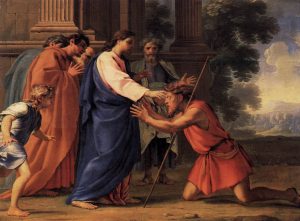We are now in the Quinquagesima Sunday, which is the last week before we enter the season of Lent. We cry out, “In Thee, O lord, have I hoped, let me never be confounded: deliver me in Thy justice and save me. (In te, Domine, speravi, non confundar in aeternum: in Justitia tua libera me et eripe me.)
This epistle, from 1st Corinthians 13:1-13, has very famous biblical quotations written by St. Paul. This is a beautiful reminder for everyone as we prepare for Lent. St. Paul describes the very nature and effects of love or charity. He reminded the people of Corinth that their conduct had been a contrast to what they believed in. Their selfishness is total opposite from charity; it does desire its own praise, honor, or pleasure. Many times, we have the same tendency as those Christians in Corinth. We may think about serving the community and our family, doing works of charity toward others, when in fact there is an ulterior self serving motive on our part in order to preserve power, honor, and glory. In so many ways, we are guilty of this sin of selfishness. I do believe that a charitable person should neglect himself and all his interests and prefer the welfare of others to its private advantage. We do charity ultimately for Christ. We commit ourselves under the Divine principle. Let us make ourselves be pleasing dwellings of this Divine Love.
This coming season of Lent, are we willing to lay aside selfish objects and aims? We need to be watchful and diligent in our prayer life. There is room to examine our Faith in God, Hope to focus on our future with God in heaven, but most importantly we have Charity to perfectly love God and others. For God is love as He is according to 1 John 4:8-16, and we must strive to reach that height of God’s love.
Today’s gospel about the healing of the blind man points to the three important ways to process ourselves as we are about to enter the season of Lent:
First, let us try to pay attention to people around us and be curious. Curiosity is not about knowing private information. The gospel points out “that the blind man sat by that wayside begging,” probably as his daily routine. Then, Luke wrote, “He heard the multitude passing by, and he asked what this meant?” He inquired about what was happening which signifies his curiosity. He wants to know what is going on, and his being inquisitive changed his life.
This is what we need to do when we meet and see new people around us, especially first timers coming and worshiping with us. This is an encouraging attempt to be open and show our interest with our fellow believers. We don’t know whether they may need assistance in trying to follow the Traditional Latin Mass. If we are snobbish and unmindful, I believe that we truly miss the point of being God’s children.
Second, let us use our instinct to listen attentively to know what is right and advantageous. Listen also to the inner voice that comes from the heart. The gospel narrates to us that when the blind man was told that Jesus was passing by, he began shouting, “Jesus, Son of David, have pity on me!” When we believe that God is present, then we must be persistent. When others are trying to silence us, please don’t be discouraged. Don’t lose the opportunity to pursue God’s blessings by being constant and relentless.
Third, let us try to be clear about what we truly need from God. Be specific, direct, and precise. This is the best way we need to pray. Not because God already knows what we need before we pray, but in this way, we recognize our own humility to depend on Him and to show that we believe in His power. When Jesus asked the blind man, “What wilt thou that I do to thee?” he answered, “Lord, that I may see.” Jesus did not assume what the blind man needed: thus, this particular story wants us to realize how we need to look inside ourselves with our prayerful request first and foremost to do His Will in all matters that concern us.
Fourth, let us remember that all the graces of healing and blessings we have received call us to acknowledge God and to give glory to Him. Psalm 116, says, “To you, Lord, I will offer a sacrifice of praise.” After the healing of the blind man, he immediately followed Jesus, glorifying Him. The blessings received by one person caused the community to glorify God also. This gospel says, “And all the people, when they saw it, gave praise to God.”
Brothers and Sisters, these inspiring readings today, I pray will help us to heal our spiritual blindness and may our profound eagerness compel us to act as Charitable Christians and humbly cry out to God in faith. We shall be healed.
God bless you.
Fr. Arlon, osa

